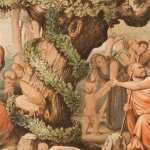My wife teaches a class once a month at her Latter-Day Saint (Mormon) congregation. She teaches the women’s group called the Relief Society. Each month she is assigned to give a lesson on the subject of a talk given by one of the (male) church leaders at the most recent biannual General Conference of the church.
Yesterday, I flipped open the magazine that contains all of the talks for the biannual period and I turned to the talk she had marked, having recently given a lesson on it. It was a talk by one of the Apostles of the Mormon Church, Dallin Oaks, one of the fifteen highest leaders of the church. My wife had marked and placed an asterisk next to the following quote which she read to her class:
“If our righteous desires are sufficiently intense, they will motivate us to cut and carve ourselves from from addictions and other sinful pressures and priorities that prevent our eternal progression.”
The gist of the article was that we should examine what we desire and determine whether our desires are consistent with the goal of eternal salvation. For example, near the end of the talk, Oaks mentions disapprovingly some women who place their desire for a career “or other mortal distinctions” above the desire for a “worthy” marriage and children. I’m not going to go into the patriarchal assumptions behind this statement or the doctrine of the Mormon church generally. Suffice it to say that, in Mormon doctrine, the word “patriarchy” actually has positive connotations. It was not until I left the church that I learned what feminism and patriarchy were all about.
I should also add that my wife does not necessarily agree with everything that is in these talks. Sometimes she intentionally draws attention to certain statements in order to get the women in her class to think about them critically (something which is rare in LDS meetings).
Anyway, the quote above caught my attention, because it seemed to suggest that we can change our character, even break addictions, by just desiring to do so with sufficient “intensity.” This statement captures the core of one of my most profound issues with the Mormon church.
Mormons are often accused of not being Christian. There are various reasons for this, but most of them boil down to the issue that they are too different from other Christians. Mormons are usually confused and offended by such accusations, because they consider themselves Christian. After all, they say, the name Jesus Christ is in the church’s official name (The Church of Jesus Christ of Latter-Day Saints), and the subtitle of the Book of Mormon is “Another Testament of Jesus Christ”, the climax of which is the post-resurrection appearance of Jesus to the ancient inhabitants of the American continent. Yet some Christians still maintain that Mormons are not Christian because the Mormon soteriology focuses on works over grace. Statements like the one by Oaks above seem to confirm this.
I recently went back to read the lengthy letter that I had written to the LDS church leadership requesting that my name be removed from the Church rolls and explaining my reasons. I was surprised to find that, at the top of a laundry list of doctrines and policies that I took issue with, was statement that the Mormon church had an inadequate doctrine of grace. My life in the Mormon church had been a long history of ineffectual striving to conform to the model of inward desire and outward behavior dictated by the church. Some people looking at my story would undoubtedly say that my exit from the church was the result of a failure of moral will. Naturally, I have a different perspective.
A year after I left the Mormon church, I was reading Alan Watt’s book about mystical experience and “incarnational” religion, Behold the Spirit, and I came across the following statement:
“Lacking such [mystical] experience, religion is only a futile straining to follow a way of life for which one has neither the power nor the grace, and there is no power in a merely theoretical grace which one has allegedly been given but does not feel.”
This quote captured how I felt in the Mormon church. I had no experience of grace. I felt powerless to lead the life which I believed was good. So I went in search of grace. I went in search of a genuine Christian experience of being saved. And I did find it. But that is a post for another day.
To return to the present subject: I take issue with Oaks’ statement and with the entire Mormon program of reforming human nature through the exercise of willpower. I believe this enterprise is doomed to failure. It leaves people feeling powerless and depressed. It is doomed because it starts from a false premise, a premise which is at the heart of all theistic religion: that the model for human behavior should be dictated from on high.
The most important realization of my entire life, the realization that truly changed my life for the better, was the realization that morality must start with human beings, not with God; that the only effective model for human behavior is one that comes from within. This idea is captured in the Humanist Manifesto (I):
“Humanism asserts that the nature of the universe depicted by modern science makes unacceptable any supernatural or cosmic guarantees of human values. Obviously humanism does not deny the possibility of realities as yet undiscovered, but it does insist that the way to determine the existence and value of any and all realities is by means of intelligent inquiry and by the assessment of their relations to human needs.”
(emphasis added).
In her book, The Vampire Lestat, there is a scene where the main character, Lestat, and his mother, Gabrielle, both recently made vampires are struggling with how to live with in their new state. (In Rice’s books, the vampires are metaphors for humans.) Gabrielle says: “There must be other ways [to live].” This sentence strikes Lestat and he writes:
“She had gone to the core. And the implications dazzled me. Always I’d felt that I couldn’t be a good human being and fight them [his family]. To be good meant to be defeated by them. Unless of course I found a more interesting idea of goodness.”
I had felt the sense of defeat. The defeat that comes with failing to live up to an externally imposed moral code, but also the defeat that comes with the success of any such endeavor. For to succeed in that program is to defeat some part of yourself, what Paul calls the “natural man”. (1 Cor. 2:14). In the Book of Mormon, Latter-day Saints read: “The natural man is an enemy to God.” (Mosiah 3:19 ). But Anne Rice suggests that there may be another way to live, “a more interesting idea of goodness”.
A more interesting idea of goodness is what I went in search of and I found it contained in this one statement by John Middleton Murry:
It is better to be whole than to be good.
It is part of a longer statement by Murry, who said: “For the good man to realize that it is better to be whole than to be good is to enter on a straight and narrow path compared to which his previous rectitude was flowery license.” To be whole means to find the guide for your life within, rather than without.
Emerson writes in his essay, “Self-Reliance”:
“He who would gather immortal palms must not be hindered by the name of goodness, but must explore if it he goodness. Nothing is at last sacred but the integrity of your own mind. Absolve you to yourself, and you shall have the suffrage of the world. I remember an answer which when quite young I was prompted to make to a valued adviser, who was wont to importune me with the dear old doctrines of the church. On my saying, ‘What have I to do with the sacredness of traditions, if I live wholly from within?’ my friend suggested,–‘But these impulses may be from below, not from above.’ I replied, ‘They do not seem to me to be such; but if I am the Devil’s child, I will live then from the Devil.’ No law can be sacred to me but that of my nature. Good and bad are but names very readily transferable to that or this; the only right is what is after my constitution, the only wrong what is against it.”
(emphasis added).
“No law can be sacred to me but that of my nature.” This was my new motto. It gives new meaning to the ideal of integrity. To be integral means to be whole. Emerson’s ideal sacralizes nature, and in doing so stands indirect opposition to the assertion that the natural man is an enemy to God. Emerson believed, contrary to Paul, that only the natural man knew God … even though to Christians that God may look like the Devil. That a notion led me to Paganism, with its Horned God, who embodies Emerson’s ideal of “living from within”.

Starhawk writes in The Spiral Dance:
“If man had been created in the Horned God’s image, he would be free to be wild without being cruel, angry without being violent, sexual without being coercive, spiritual without being unsexed, and able to truly love.”
I believe that good and evil should only be defined in human terms; that any ethical discussion should begin with humans, not God — with nature, not the supernatural. I believe that moral values should be derived from human needs and interests, rather than theological or ideological abstractions. I believe that ideas divorced from human experience are dangerous and can be used to justify terrible evil. As one of Anne Rice’s characters says in Queen of the Damned: “In the flesh all wisdom begins. Beware the thing that has no flesh. … beware the idea.” She goes on:
“I tell you, we would be hard put to determine what is more evil—religion or the pure idea. The intervention of the supernatural or the elegant simple abstract solution! Both have bathed this earth in suffering; both have brought the human race literally and figuratively to its knees.
“Don’t you see? It is not man who is the enemy of the human species. … it is the spiritual when it is divorced from the material; from the lesson in one beating heart or one bleeding vein.”
The notion of the “wisdom of the flesh” would be appalling to many Christians, who, following Paul believe that “desires of the flesh are against the Spirit” (Gal. 5:17). They would see the mandate to live from within as an endorsement of hedonism. Hedonism gets a bad rap in Christian discourse, but the Epicureans were the earliest hedonists and they advocated temperance and moderation.
In another one of her books, Pandora, Anne Rice’s titular character responds to a challenge that we must not abandon ourselves to our senses: “Have I said anything about abandon?” she asks. “To yield is not to abandon. It is to honor. I speak of a prudent life; I speak of the wisdom of listening to our bodies. I speak of the ultimate intelligence of kindness, and enjoyment.”
To honor the physical. To listen to body. To enjoy the senses. This is a truly Pagan ethic.











